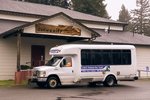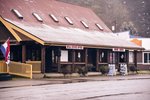









The new ability to work from home has caused an American exodus from big cities to more rural, peaceful communities.
As the Lewis Economic Alliance (formerly the Economic Development Council) wrote in April, Packwood’s “housing market has exploded as urban dwellers discover the beauty of this rural setting.”
That phenomena is not unique to Packwood, but coupled with a huge boom in tourism, the unincorporated East Lewis County town is now facing an interesting issue unlike others in the county. Homes are being built and bought to make vacation rentals, and housing prices are soaring well beyond what locals can afford.
“Before the mill closed, I think anybody who was out there would have told you, ‘It is a town, it is a fully functioning town.’ But a lot of employment left when the mill closed,” said Lewis County Senior Long Range Planner Mindy Brooks. “Basically, Packwood went into its own little recession.”
Since that time, the town has been redefining itself. Nestled between Mount Rainier, the Goat Rocks Wilderness and White Pass Ski Area, it’s a hot spot for skiers, hikers, seasonal White Pass and forest service workers, backpackers and anyone seeking a weekend getaway in a cozy cottage.
According to a news release from the county earlier this week, in 2019, the Packwood visitor center saw fewer than 2,000 visitors. Through October this year, it has welcomed 5,800 guests.
It has therefore become highly profitable to be the owner of a short term rental (STR) — such as an Airbnb or VRBO — in the Packwood area.
A quick search on Airbnb for a Packwood stay with no selected time frame pulls up around 216 results. Almost all of those are in full, single-family cabins. At about $200 a night, owners could be making $1,400 per week off their STRs, well over what they would make off the place as a long term rental (LTR).
According to Brooks, and to the concern of residents, the county has “no good data” on the total number of Packwood STRs, and she believes 216 is probably an undercount. Even if that number was accurate, it would already represent 12% of the around 1,800 residential parcels in the greater Packwood area.
“People are realizing they can make quite a bit of money on their property that they already own in Packwood if they rent it out nightly,” said Gretchen Fritsch, a Packwood resident. “So people are buying up these houses at a cost that nobody (local) can buy … We’re finding ourselves heavy on the STR and very scarce on the LTR.”
Fritsch is originally from Packwood and graduated from White Pass High School. She lived elsewhere in her 20s and returned to raise her family, hoping to offer them the same safe and supportive community she grew up in.
Now, she is an active community member, running the farmer’s market and working at White Pass Ski Area and the coffee shop. One of the things that has allowed her the privilege of being involved in her community, she says, is homeownership. Just a few years ago, she and her family were renters without the same feeling of stability they now have.
“Anyone who does not own their home is living with that stress like, ‘Oh no, when are they going to bulldoze this single wide I’m living in and put a half million dollar house on it?’” Fritsch said.
Speaking to The Chronicle, Fritsch noted she did not intend to be the spokesperson for her entire community, but that she had spent time talking to other residents with the same concerns. She said she felt Packwood residents were “pretty united in the feeling that this place is not what it used to be.”
“My total fear (is) that we’re all going to be pushed out to live in Glenoma and bussed up to make coffee and clean rentals in Packwood. I don't think that’s going to happen next year but down the road,” she said.
If that were the case, she said, Packwood would become a less desirable place for tourists and residents alike.
Last week, a few days before the Lewis County Housing Summit, Fritsch brought her concerns to the Board of County Commissioners (BOCC), hoping to express Packwood’s need to be included in the housing conversation.
“Showing up at the BOCC meeting was totally just unplanned, unscripted and so it was nothing formal at all. I might have jumped the gun by doing that, but I just can't not act,” Fritsch said. “It’s so emergent and it's so important that I just had to say it.”
With Brooks at the helm, the county is seeking to address Fritsch and other residents’ concerns. This week, it announced the development of a sub-area plan for Packwood.
Brooks was hired by the county due to her city planning background, and is among those who have enjoyed having a cabin in the east county town. When COVID-19 allowed her family to work remotely, their vacation house of 10 years soon became their full-time home. Though, she’s definitely not on vacation anymore.
Even before moving to the area full time, Brooks presented to Lewis County staff the idea of a sub-area plan for Packwood, a point she emphasized during her application to her position now.
The creation of the tool is a year-long process, meant to ensure the longevity of the plan itself. It essentially establishes a vision for the Packwood area, put forth by residents, that policies for the next 20 years must align with.
“If the community said, ‘We want to stay exactly like we are, all single family residential. We don't want sewer downtown. We want to keep it the way it is.’ That can be the answer. I don't think that's the answer that people really want. That's what we have to suss through with everybody,” Brooks said. “Then it becomes kind of the law of the land and everything else you do has to sit under that umbrella. It's a long process, but it's a really important one.”
While Fritsch said some Packwood residents have felt ignored by the county in the past due to its remote location and unique identity, the housing situation feels less county versus Packwood and more like something that needs collaboration and careful planning, and she’s thankful for all that Brooks has done so far.
“I want the STR people at the table, the baristas at the table, I want the short term liftees (White Pass employees) at the table,” Fritsch said. “I don't want to get involved in shouting matches or pointing fingers at my community members.”
And some of those STR owners are involved community members, she said. What concerns her the most are those who live disconnected from the town but own 10 Airbnb cabins, many of whom she said hire management companies to clean and run the cabins so owners aren’t required to even visit, let alone offer local employment.
For those just moving in and those who’ve lived in Packwood their whole lives, both Brooks and Fritsch believed the goals weren’t so different: they want a small-town feel, a safe community and to be surrounded by the beauty of the low mountain land.
“People are leaving big cities for a reason. And they don't want the big city to follow them to their small town that they're choosing to go to,” Brooks said. “There's a good way to have that conversation where it doesn't have to feel like it's people who have been there for 50 years against people who've been there for a year just arguing.”
The first steps of the sub-area plan will be diagnostic, with the goal of finishing the plan in early 2022. It will begin with surveys and committees — hopefully composed of representatives from all perspectives of the situation — and once signed off on by the BOCC and the state, the plan can be used to guide policy decisions.
If the sub-area plan suggests regulation of STRs, the county won’t have to reinvent the wheel. Currently, they’re defined as single family residences. Regulation could mean treating STRs as a business or as a special land use. Brooks said many other communities in Washington, such as Chelan County, have put forth great models for this same scenario.
“We just have to decide, as a community, what's right for people,” Brooks said. “We'll work through it, we'll find it. We'll find an answer that fits for Packwood and its unique space.”